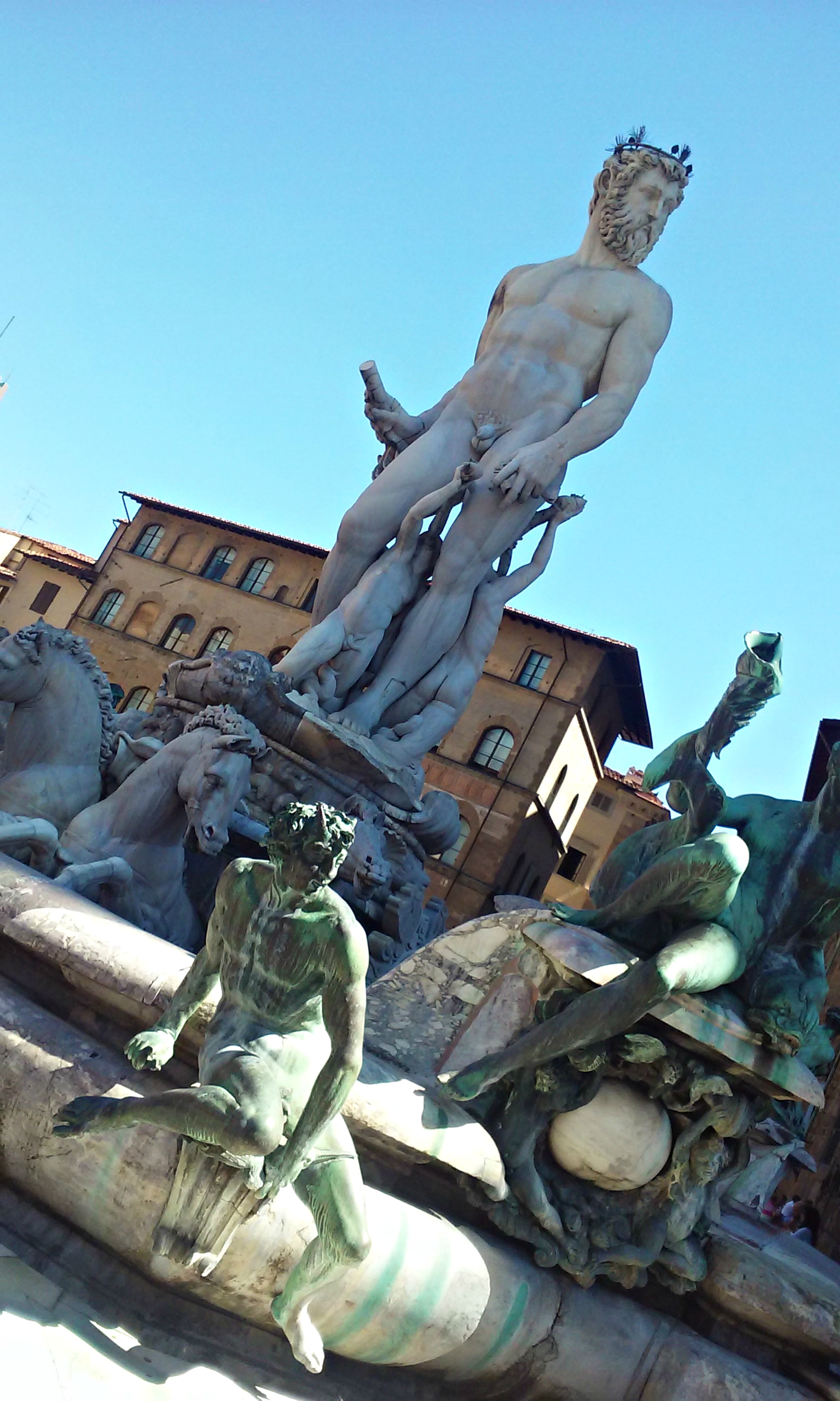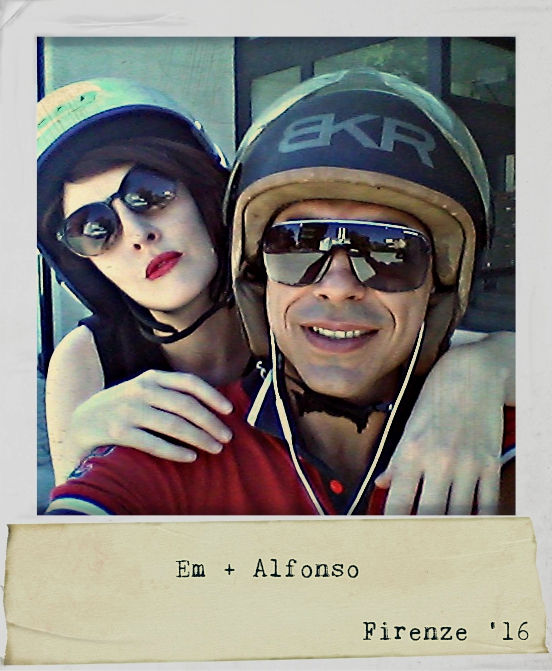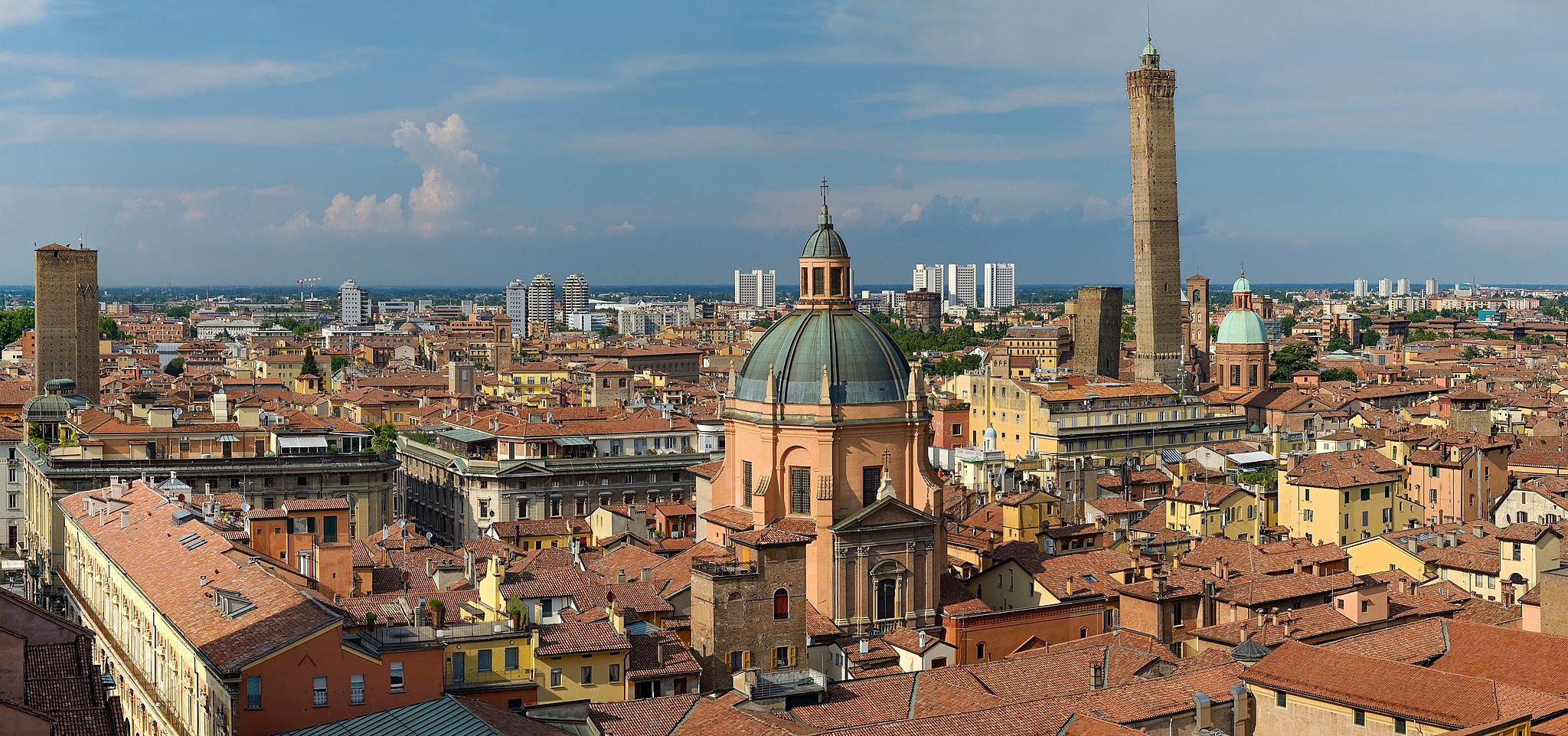A Room With A Brew

By Emily Linstrom
Last August I traveled to Italy to assist a friend who was shooting a documentary. That month took me to many places—Venice, Padua, Milan, Lake Como, and even Napoleon’s 100-day île d'exil, Elba. Some places I only touched down on, granted just enough time to get a tantalizing taste before moving on. Other locales I dwelled in longer. One destination stood out as a necessary point of pilgrimage: Florence, my late grandmother’s favorite city.
I often speak and write of my grandmother, for reasons too numerous and intricate to adequately summarize. In her lifetime she was devoted to the arts, to history and literature; she was a humanitarian, a survivor, a lovely soul. She was a lady. And one of my fondest childhood memories was watching the Merchant Ivory adaptation of “A Room With A View” with her, swooning over the scenery and lush score and beautiful, bare-bottomed weirdo Julian Sands. She had been visiting Florence while they were filming, and often spoke of encountering Edwardian-costumed actors taking their lunch breaks in the local cafés and piazzas. We read the book and discussed, played the soundtrack, and she told me that of all the cities she’d visited in her later years, when her husband had passed and her children had grown and the world had made a door for her again, Florence had her heart. And in hopes of encountering it again, I set off by myself to Firenze for a few days.
I was traveling on a modest writer’s budget when I landed in Florence, which is to say I had enough money to walk around, soak in every detail twice, swoon over Botticelli’s Primavera and Birth of Venus at the Uffizi, and sip an Aperol spritz on a rooftop with Il Duomo di Firenze in plain view—all of which was more than enough and then some. I discovered a fantastic donation-based company called Florence Free Tour and blissed out on their walking Medici tour of the city, which highlighted the family’s reign and lasting influence. (According to popular accounts, you have Catherine de’ Medici to thank for gelato as we know it.) I also found out I was a star-studded stone’s throw from where Jessica Chastain was vacationing with her family. (Hey, I’m only human.)
And through it all, my grandmother was everywhere.
I rented a room through Airbnb in an apartment not far from the city center, owned by a warm and worldly Argentine named Sole who offered his guests nightly classes in pasta making and optional astrology chart readings. (Pisces, and I’m a lousy cook.) One night he invited a friend over, a man named Alfonso who, it was translated to me, was the founder of an ethically sourced and operated luxury coffee brand called Caffè Pontevecchio Firenze.
As someone who has a whole tier of her nutritional pyramid dedicated to coffee, obviously my interest was gluttonously piqued. But the more I learned of Alfonso’s company and sustainable philosophy, the more I became convinced that his story was well worth sharing.
Named after the Ponte Vecchio (old bridge), that has long been home to Florence’s most exquisite artisans, Alfonso founded CPF with the mission to produce superior coffee blends that don’t profit from the inferior treatment of the workers producing it. He would later demonstrate with a lighter and CPF coffee capsule the 100% biodegradable, compostable materials used to produce the Nespresso-compatible pods. I was impressed but skeptical—how do you develop a successful brand that ranks among the fiscally elite while maintaining an equal respect and reverence for the growers and workers spanning 9 global regions? It was a sad indication of my Western worldview.
Florence made a name for itself as a powerful banking capital, backing the English monarchy during the Hundred Years War, to name a few celebrity clients. Only later would the city share its reputation with the art world, eventually minting its position as a cultural North star. Art and commerce go hand in hand in Florence, with the city often cited as the birthplace of Italian fashion. Roberto Cavalli, Patrizia Pepe, Emilio Pucci, and Gucci are just a few of the labels founded and headquartered in Florence, with Alfonso’s CPF studio sharing the same hall as Gucci’s headquarters. My poet’s allowance kept me off Via de' Tornabuoni, but it didn’t deter those eager and able to ogle the statue of David in a Scervino parka.
My point is, Florence is a city of unabashed luxury, with roots that sprouted from gold florins and blossomed into the gorgeous and gorgeously expensive city it is today. And because luxury and ethics aren’t common bedfellows, encountering a successful entrepreneur who produces an unquestionably refined product with unwavering values was something that, well, reminded me of the woman I made my Florentine pilgrimage for.

I begged Alfonso for an interview, which he graciously accepted. My compensation was an extra night free at Sole’s and a treasure trove of CPF coffee—again, more than enough for this scrittrice. And because my Italian is pitiful and Alfonso’s English is still in progress, the multilingual Sole agreed to translate the interview.
The following morning Alfonso picked me up on his Vespa and offered me a Bourne-worthy high speed tour of the Florentine landscape, stopping off at the Pontevecchio headquarters to show me the full range of products, company catalogue and press packet, as well as demonstrate the biodegradability of the materials. From there we met Sole at a café close to the cathedral, and spent the better part of the afternoon conversing in our Italian-American-Argentine trifecta.
*
Q: What was your inspiration for founding Caffe Pontevecchio?
A: I used to live around Ponte Vecchio, and every morning when I’d wake up I would just marvel at the view. And I’d see visitors and locals alike having their morning coffee and realized this was something uniquely Italian. For us coffee is a ritual, we wake up every morning and the first thing we do is get the coffee. And I wanted to bring that to the world, to show Florence through the coffee.
Q: What were your first steps of action from there?
A: I organized a team of people who shared the same passion and we began to travel around the world, visiting many countries that produce coffee. We were looking for places that didn’t just produce, but respected human value—fair pay, no children working, 100% organic and biodegradable materials. I also wanted to make sure that profit wasn’t just made but distributed—yin and yang, I get and I give. I wanted to be able to speak personally to the coffee plantation farmers and ask ‘are you getting paid well?’ ‘are you being treated well?’
Q: Any instances that stood out in your travels?
A: During one of my trips to Colombia I toured a facility that culls coffee by hand, run entirely by women. Colombia has an amazing quality of coffee, but the people who produce it don’t live so well. That was where it really struck me that I wanted to invest in people, not just my own product. When you give jobs to people you have a social role in the world, you don’t need to be stingy. Even spending a few cents more and paying yourself a little less goes a long way in improving someone’s quality of life—imagine how much farther you can go? Why wouldn’t you?
Q: How else did you want to set Pontevecchio apart from other coffee brands?
A: Quality, absolutely. When it comes to roasting we use a handcrafted way to produce the coffee. For example, beans from Colombia need to be roasted for 50 minutes at 180 degrees, whereas Brazilian coffee has a different way. Over the years we learned to work with every coffee per the region it came from. Some companies get coffee from all over, roast it all the same way, then cool it down and package it. The handcrafted way, you separate and mix, and keep testing to find the right blend. Eventually you get a taste that is true to the natural origins.
Q: Did you have any problems when you started the company?
A: (laughing) When I was starting the company, I had only problems. When I introduced friends to the concept of the product, they thought I was crazy. The company started in the garage of my apartment. Some of my partners left because they wanted to go into the market with a lower cost of production, not a lot of concern for the people working in the field, only looking to make a profit. And I’d keep arguing that a company is more than a profit, it’s a social value, that the more WE make the more THEY should make. But you know, I think everyone starts with challenges. The question is, how to turn the challenge into opportunity?
Q: What was your design inspiration—the appearance, packaging, etc?
A: Florence is a city of goldsmiths; the Ponte Vecchio has been their home for centuries. I decided to use black and gold on the packaging to represent that. For some special clients we even use gold paper. The brand is an expression of luxury and quality, but also the Italian style, which is all about the quality of life, the good life
Q: Where was the first location, and how did it expand from there?
A: Our first exhibition was in Dubai in 2015, an expo to sell to prospective airlines. We set up a café, and people were asking “What are you doing here? All these big names and companies, who are you?” By the end of it we’d gotten several contracts with some leading airline companies. Since then we’ve opened boutiques and sold at establishments here in Europe, as well Singapore, Shanghai, and Hong Kong, with upcoming US locations. We’re additionally partnering with Gianfranco Lotti.
Q: Your biodegradable capsules are a crucial component of the brand. Can you explain how you came to produce them?
A: One client came to me and pretty much said we need a capsule that doesn’t contaminate the world. We did the research and started to learn about the recycling system. The problem is, recycled materials take time and aren’t always guaranteed. So we began to experiment with 100% organic, grain based capsules that can either be directly composted into the garden or, when thrown out, will safely decompose within the week. It was a challenge. Plastic contaminants are everywhere, and cheap to utilize, but our client was right—they go against everything we stand for. What’s more, you can’t encapsulate the flavor of nature in plastic.
Q: How has the Italian spirit influenced CPF?
A: Few people know this, but Ponte Vecchio was one of the few areas not destroyed during WWII. ‘Vvittoria’ means victory in our language, spelled with eight letters. 8 is the number of continuity, of the never-ending We Italians love competition, we believe it’s how we express our best creativity. In Italy we have many brands, the competition never ends, but that’s how we improve ourselves. Defeat and victory are part of the same cycle, Italians know this. And I keep it in mind every day when I go to work.
*
My grandmother would often say that kindness is the ultimate wisdom. Perhaps that was why I was so eager to conduct this interview, to pen this ode—not just to her or Alfonso or even Florence, all of which are more than worthy subjects. We live in a largely unjust world, ruled by a kind of entropy that thousands of years of war and religion and philosophy haven’t made sense of. We’re starved and brutalized on one side, and tipping with riches and privilege on the other. And the imbalance is glorified everywhere, from our magazines to our movies, even our news and social media. Luxury is something we all crave, and I tend to wonder if there’s not a darkly coiled part of us that doesn’t value it even more if it works in contrast to another’s comfort and sense of value. Isn’t that how envy itself works? To that end, Alfonso stressed, “Luxury should not come at the cost of someone else’s suffering or lack of quality of life.”
So shines a good deed in a naughty world.
Many thanks to Alfonso Petrella for his time and generosity, Alex Solecosta for acting as translator, and Davide Villa for the Italian transcript.
Emily Linstrom is a writer & artist currently adventuring abroad. Her work has been featured in Three Rooms Press, Nailed Magazine, Rogue Agent Journal, Prick of the Spindle, Queen Mob's Teahouse, Scrutiny Journal, Flapperhouse, Homestead Review, American Slander, Misfit Magazine, and Yes, Poetry, as October's featured poet. She was the first prize recipient of Pulp Literature Press's 2015 The Raven short story contest. She is a regular contributor for Quail Bell Magazine. You can view her work at: www.emilylinstrom.com






